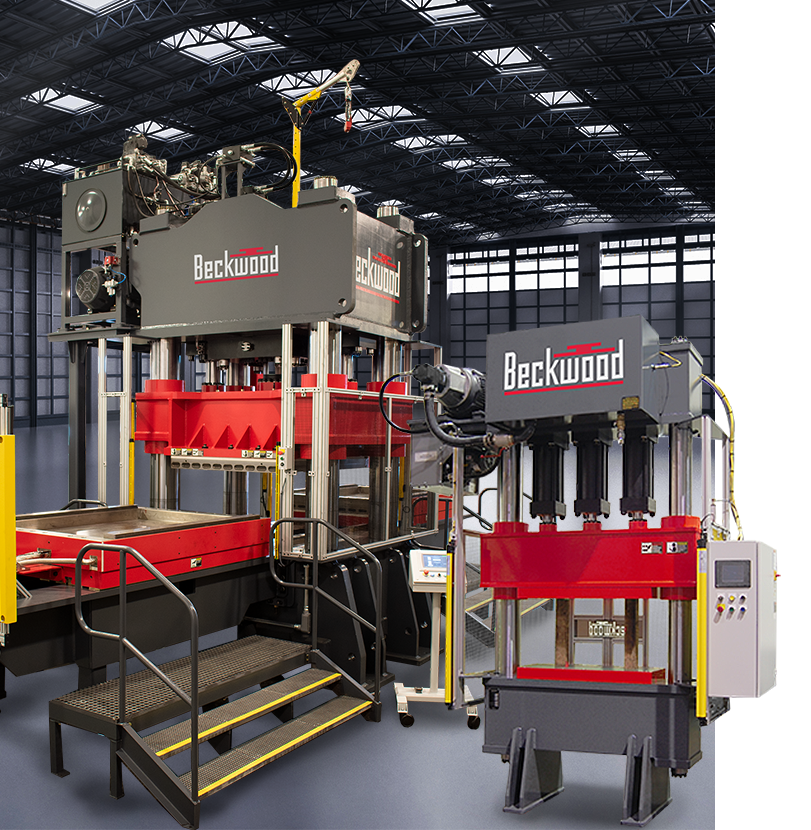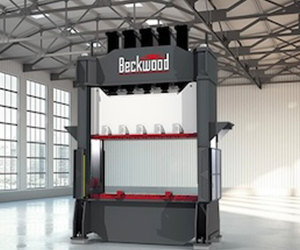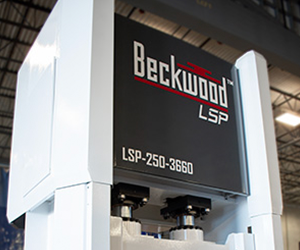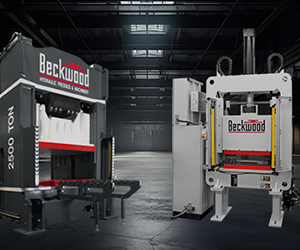How Do Hydraulic Presses Work?
Hydraulic presses work by employing fluid pressure, generated by a pump and motor, to push a cylinder at a set force to compress, assemble, draw, punch, trim, stretch, stamp, and form materials for a variety of industries. The motor pumps the fluid into the cylinder through the cap end port or rod end port, depending on whether the press is extending or retracting. Pressurizing the cap end of the cylinder causes it to extend. Pressurizing the rod end of the cylinder causes it to retract.
Pascal’s Law forms the foundation of a modern fluid power system which states that pressure equals force divided by area. By increasing pressure and/or the forming area (larger cylinders and/or bed size), hydraulic presses can achieve more force. This creates the unlimited potential for creative engineering and customization in a hydraulic press.
What are the Benefits of Hydraulic Presses?
Hydraulic presses offer several primary benefits, including full tonnage throughout the stroke, customization, flexibility, and longer tool life.
A hydraulic press’s greatest advantage is the variable stroke. Because the stroke is programmable, it can achieve full tonnage anywhere throughout the stroke. The principles of hydraulic force inherently allow for customization, flexibility, and creative engineering.
Due to the programmability of the system, hydraulic presses can meet both simple and complex forming requirements. Hydraulics allow for unique press designs including down-acting, up-acting, side-acting, and multi-action operations. Power systems can be placed above, below, or adjacent to the press. Large hydraulic presses can be designed for low-tonnage applications, and small hydraulic presses can be designed for high-tonnage applications. Additionally, tooling is developed to fit the application, not the press; and because hydraulic presses use relief valves to protect against overloading, the tooling never experiences undue stress.
Beckwood Hydraulic Presses
At Beckwood, we build machinery to meet your needs—whatever they may be. Below we have grouped our hydraulic presses by the most common frame styles to help you discover the value Beckwood will bring to your operation. Explore our range of hydraulic machinery to see for yourself what sets Beckwood apart as a leading hydraulic press manufacturer.
Custom Hydraulic Presses
Custom Hydraulic Presses
Gib Guided
Gib Guided
4 - Post
4 - Post
2 - Post
2 - Post
C-Frame
C-Frame
Standard Quick Ship
Standard Quick Ship
Non-Traditional
Non-Traditional
A Hydraulic Press Manufacturer
Like No Other
With over 45 years of history rooted in manufacturing specialized hydraulic presses, Beckwood has the knowledge and expertise to exceed your expectations. No other hydraulic press manufacturer delivers more experience building press systems across such a diverse assortment of industries, applications, and structures. With this knowledge, we apply techniques and features we’ve learned from one industry into hydraulic presses for another. This distinct experience gives you peace of mind knowing no other machine will perform more efficiently, safely, and reliably than a Beckwood press.

If you don’t see what you’re looking for, don’t worry;
we can manufacture a press to benefit your process.
GET A CUSTOM QUOTE TODAY!
How Much Do Hydraulic Presses Cost?
The cost of a hydraulic press can range from as little as $10,000 to over $5 million, depending on the press type, capabilities, and age. For this reason, it is important to consider all the factors that influence the cost of hydraulic presses.
Types of Hydraulic Presses
H-frame shop presses and benchtop presses with a C-frame configuration are usually the lowest cost hydraulic presses due to their small size and low tonnage capacities. Larger c-frame presses and 2-post presses are the next lowest in cost, which can make them a great choice if their size and tonnage capacities meet your press requirements. 4-post and gib-guided hydraulic presses are typically more expensive, but they offer the largest range of forming flexibility and the closest precision tolerances.
Capabilities of Hydraulic Presses
Standard hydraulic presses are pre-engineered for cost efficiency, but they are limited in size and force by the pre-determined specifications for the product line. They also may not include supplemental options like heated platens, automation equipment, or Active Leveling Control. This means you may have to compromise on a particular parameter in order to fit within the standard specifications or pay extra for certain features.
Unlike shop presses or standard machinery, custom hydraulic presses are engineered to order and usually come at a higher price tag. However, with a custom hydraulic press you’re guaranteed to own a machine that’s tailored to your exact application needs. Bed size, speed, tonnage, heating, cooling, automation, and more are fully customizable to meet any process goals. To mitigate costs wherever possible, custom hydraulic press manufacturers frequently use value engineering principles and standard, off-the-shelf components.
Factors such as tonnage, speed, accuracy, ancillary operations, and programmability all play integral roles in determining the final cost of a press and whether you need a standard or custom
machine.
New vs. Used Hydraulic Presses
Used hydraulic presses typically have a lower upfront cost than new machinery. As with standard presses, the pre-determined specifications of used hydraulic presses can be a limiting factor. Additionally, used hydraulic presses commonly carry a slew of hidden costs, especially when the maintenance history or previous use conditions of the machine are unknown. Used hydraulic presses almost never come with a warranty, and maintenance services and replacement parts can be difficult to source. Similar to a mechanic testing a used car, used press buyers should enlist factory trained technicians to perform a used press audit prior to purchase to curb any limitations and uncover hidden costs.
New hydraulic presses can vary in cost depending on size, tonnage, speed, and many other factors. Unlike used presses, they are built using the newest components and come with a warranty from the original hydraulic press manufacturer. New presses are free of hidden costs and don’t require costly retrofits after installation. Many new hydraulic press manufacturers also encourage customers to attend the final inspection and runoff to verify all key performance specs are met prior to shipment.
Conclusion
In summary, the cost of a press can vary greatly depending on the type, job requirements and whether it is new or pre-owned. Due to this, pinpointing the exact cost of a press is best established with a hydraulic press manufacturer who can provide accurate, customized pricing per your specifications.
What Can Hydraulic Presses Be Used For?
Hydraulic presses can be used to compress, assemble, draw, punch, trim, stretch, stamp, and form materials for a variety of industries to make the products we use every day. Available in an unlimited combination of sizes and frames, hydraulic presses operate at varying speeds and pressures depending on the application for which they are used. With this versatility, our products can be engineered to benefit all industries—below are just a few industries that we serve.
If you don’t see your industry, don’t worry; manufacturing custom hydraulic presses to benefit your process is our specialty.
 AEROSPACE
AEROSPACE
Whether it is hot forming, compression molding, or hydroforming, the aerospace industry uses our hydraulic presses to form countless parts on commercial and private aircraft–from exterior wing stringers to interior wall sections and everything in between. We created our Triform line to provide a diverse mix of turnkey forming solutions to outfit an entire aerospace facility.
 AGRICULTURE
AGRICULTURE
From the tools that tend the food we eat like tillage discs and blades, to the bulldozers and tractors that roam the farms, you need a machine that you can count on. We’ve customized 4-posts and servo-electric machines that benefit agricultural production.
 AUTOMOTIVE
AUTOMOTIVE
Performance brake pads, hood liners, railroad ties, solid state batteries; our hydraulic presses form them all. We engineer for a wide range of applications in the automotive industry including stamping for high volume parts and assembly for rapid, uniform production. We design hydraulic presses for all types of vehicles like trucks, buses, tractors, street sweepers, trains, and more.
 CONSTRUCTION & HVAC
CONSTRUCTION & HVAC
Our hydraulic presses help pave the roads you drive on and construct the buildings you work in. We engineer machinery to manufacture large pre-cast concrete panels, lighting post tops, heat exchangers for heating & cooling systems, and lightweight insulation panels. With applications like mixing, spreading, molding, and forming, our hydraulic presses can be used for any commercial construction project. We are Beckwood tough, and the machinery building your infrastructure should be too.
 CONSUMER PRODUCTS
CONSUMER PRODUCTS
Our hydraulic presses make goods that go directly onto consumer shelves. Cleaning supplies, appliances, door mats, shoes, sporting goods and more are produced by various applications. Our machines can even be clean room-rated and engineered without hydraulics, making them ideal for food processing and packaging.
 DEFENSE & MILITARY
DEFENSE & MILITARY
As an American hydraulic press manufacturer, we take pride in supporting the U.S. military & defense sector. Tier 1 suppliers rely on our products to form protective gear like helmets, armor, and weaponry as well as components for military transport vehicles like composite helicopter blades or interior UHMW panels on nuclear submarines. Our forming doesn’t just stop at the military but goes into private consumer sectors to make bullets and other safety systems.
 EDUCATION (RESEARCH & DEVELOPMENT)
EDUCATION (RESEARCH & DEVELOPMENT)
Our hydraulic presses play a key role in research and development across a multitude of sectors. Trade schools, universities, and even national labs trust our programming capability for the upmost control, our recipe functions for repeatable forming, and our accurate feedback systems for part traceability when it comes to new part development and research.
 ELECTRONICS
ELECTRONICS
Electronics and technology assist all areas of our lives by making processes easier and more efficient, and that’s exactly what our presses are used for. Our servo-electric and hydraulic presses are used to hydroform, stamp, trim, and assemble components for computers, micro-processors, and tele-com infrastructure.
 ENERGY
ENERGY
We aid the energy industry in making our world more efficient with machines that form solar panels, parts for nuclear power plants, and more. Our servo-electric line is great for this industry because it offers the highest precision and repeatability of any press available today, with models up to 200 tons.
 MEDICAL
MEDICAL
The medical industry needs clean and precise machinery for medical device manufacturing and assembly, and that’s why Beckwood presses are the best solution. Our presses are used to assemble cathodes in pacemakers, form titanium artificial joints as well as knee and ankle orthotics, and even bending endoscopy tubes or compressing seats for wheelchairs. Whether Beckwood, Triform, or EVOx, we have options for cleanroom environments and precise formability.
 MINING
MINING
Whether you’re shearing steel bar stock or making hot forged parts in a temperature-controlled forging press, we support the mining industry with equipment that makes mining easier, safer, and more efficient.
 OIL & GAS
OIL & GAS
The oil & gas industry keeps everything around us moving, and we build vigorous machines able to clamp and assemble pipeline, or bulge form large tank heads for fuel trucks. You need high tonnage capabilities more than any industry, and we engineer presses from 200 – 4000+ tons.
 PLASTICS & RUBBER
PLASTICS & RUBBER
Our compression molding hydraulic presses can form a range of materials including different plastics, composites, and rubbers that make the goods we use like tires, mulch, edging, or playground flooring. Compression, injection and thermal transfer molding are crucial applications for this industry in order to form the lightweight, high-strength bonds necessary to make these products viable.
 WASTE MANAGEMENT
WASTE MANAGEMENT
Our hydraulic presses are used to compact, bale, destroy, and press scrap metal, electronics, and other materials under extreme tonnages. They aid in waste management across all sectors.

Choosing the Best Features for Your Custom Hydraulic Press
BLOG



